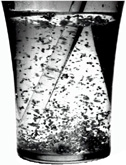
Comment
on this story |
 |

Leaving a trail of memories behind
by Adrienne Martini
So much is lost. My marbles, to start with, have been scattered to the globe's corners, where they spin frantically beneath a Mongolian kid's bed or a Russian mob boss' bidet. Which is fine, really. I never quite understood the point of playing with them in the first place.
Also missing are several dozen baby socks. I still have their mates, of course, but the other member of the pair has wanderlust and has gone off searching for meaning or my marbles or something. Gone as well are most of my pens, which have been redistributed throughout the house by a curious toddler, a distracted husband and some bored cats. These aren't losses that are keenly felt. I can buy more tiny socks and Pilot pens.
What hurts is the lost information. I'm not talking about the kind stored on a hard drive, coded into zeros and ones. While a major malfunction can sting like hell, most of what disappears is still there, if only you have the resources to dig it out. It's that other kind of memory, the stuff stored in the squishy bits of the human skull, that has vanished and can never be found again.
My father has been reconstructing what he can. My grandmother gave him a box of black and white photos that he has been sorting through and pasting up. The earliest date from my grandmother's honeymoon and run up to just before my grandfather's death, which happened when my dad was a teenager. No one seems to have taken pictures after that—or if they did, they didn't save them.
Flipping through them is something out of science fiction, a journey in both time and space. Here are the snapshots my grandfather sent back from Sabu Island, near Indonesia, where he built runways during World War II. Here is my impossibly young grandmother wearing a smart pantsuit ripped straight from a Katherine Hepburn movie. She looks like a very young Madonna, before Madonna discovered the power of lingerie. Here is my dad as a baby. Here is a holiday dinner, where my grandfather's face is tight and hollow, the cancer already established. Here he is as a young man whose nickname was Samson and he is playing flagpole, which is where you grab a fence post and use your upper body strength to hold yourself perpendicular to it, like a pennant in a wind. These are the things we can see.
There's so much that our eyes can't tell us, though. Why does my grandmother never smile? Who are some of the people in the background? Who is the woman who shows up in all of the pictures of my grandparents on some nameless beach? What happened during all of the gaps, when no photos were taken—or if they were, not saved? The people who are still here, who might know, aren't reliable narrators anymore. My grandmother reinvents stories with changes in weather, massaging the details to suit her needs. It's not malicious. She just doesn't remember anymore.
My mother's side of the family is no better. There are several boxes of loose pictures floating around, which, as a kid, I'd randomly stumble across. One contains a pair of '60s aviator sunglasses, some military patches and name tag, and photos of a cute young man in full gear. At first, I assumed it was some flyboy that my mom had a crush on back in the day. He looks too much like my grandfather, though. When I bring all of this to my mom, she explains that it is my uncle, the one who killed himself after returning from Vietnam and who no one really talks about anymore. And when they do, the stories always change. The information is corrupt.
I'd like to say that I'm doing better at leaving a concrete trail of my life for my child. I suck at it. The snapshots I take are all label-less and jammed in a box, where they sit until I get off of my lazy rump and sort them. There will be written documents, granted, but all of these are tinged with my own narcissism and prejudice. The most potent pieces are the ones written in the throes of rage or fear or exhaustion. I don't know that future generations will like me much, if they only have these records to work from.
They will, however, have my father's pictures. He snaps more with every visit and assembles pages with labels and a sense of story. And he doesn't just take them during the good times, like holidays and birthdays, when everyone is putting on their happiest face. The pages chronicle the lousy days, too. During his most recent visit, when the baby had a fever and a bad attitude, he kept rolling film, capturing the tears and the tantrums and the infrequent smiles. Once developed, they'll go into the album as well, where they'll help us hang on to what data we can, before our own memories cloud. None of this will get lost and, maybe, my child won't have to puzzle through all of the unsorted faces and liquid stories in search of solid information.

December 4, 2003 * Vol. 13, No. 49
© 2003 Metro Pulse
|